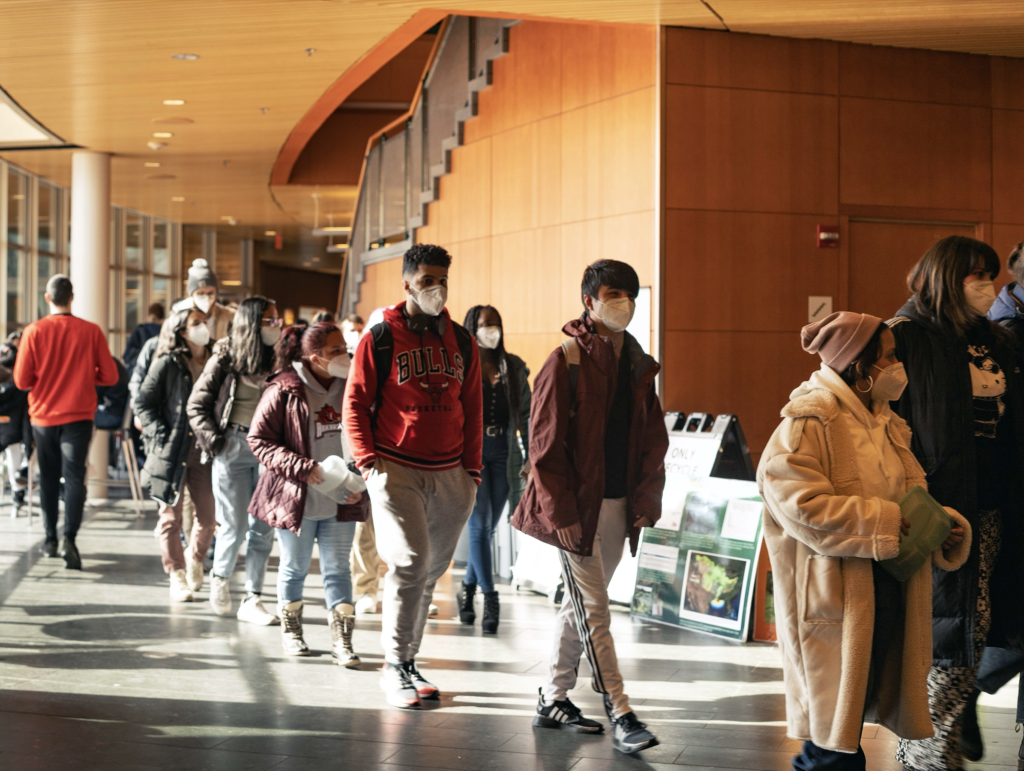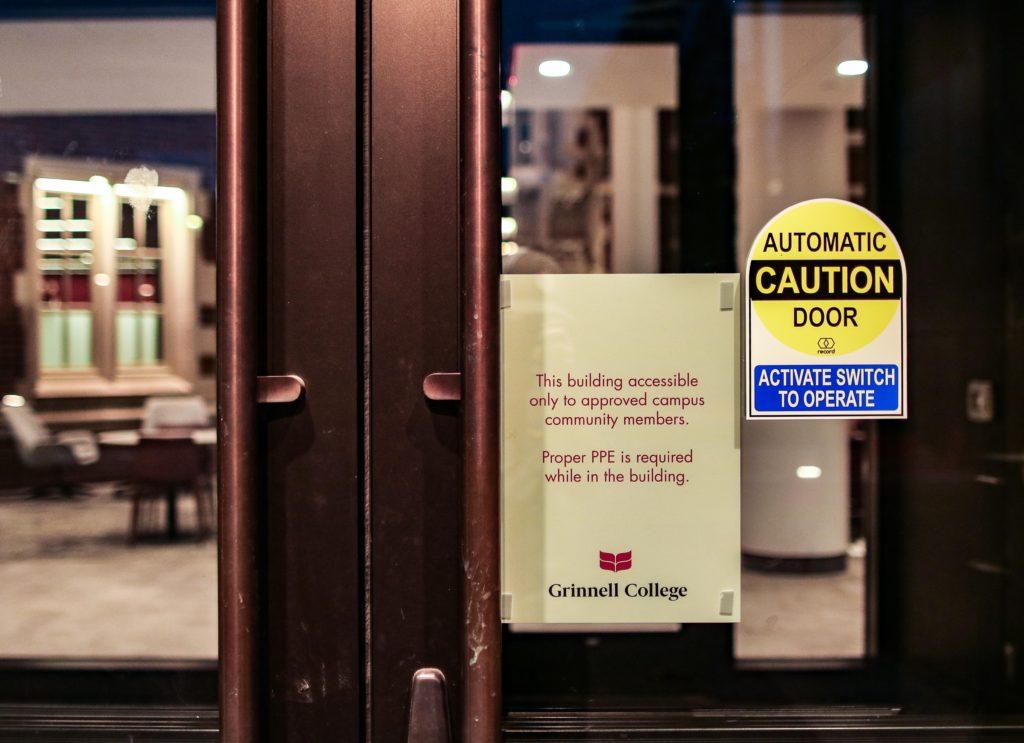Students rushed out of the dining hall after the College emailed out a lunchtime Special Campus Memo on Tuesday, March 10 stating that the remainder of spring semester would be completed via “distance learning,” and that students would have to leave campus by March 23 (a date that was later moved up a week to March 16).
In front of the JRC, almost a dozen students fought for reception, attempting to make a call. People stood on Mac field in small groups, talking in hushed tones or comforting one another. While each student had their own particular concerns, they were all worried about the same thing: Where will I go and how will I get there?
Student Affairs compressed students’ options into an online survey, which gave them the option to petition to stay on campus if they were unable to return home by the required date. For students with financial restrictions, logistical travel restrictions or other difficulties at home, this was an enormous relief.
Andy Kenley ’22 was one student who initially appealed to stay on campus. A member of his family is immunocompromised, and he said that a plane ticket home was cost-prohibitive. Despite these reasons for staying at Grinnell to finish the academic year, Kenly’s petition was rejected.
The College later sent out more information detailing the appeal process and other expectations for students staying on campus. Dean of Students Ben Newhouse said that in their efforts to protect both the College and the community, the team that he worked with tried to make sure domestic students that legally had a “home” were sent to it. Kenley said that he wishes the criteria for being able to stay on campus had been made clear to students from the get-go.
According to Kenley, almost every domestic student that he talked to was denied. Sarah Beisner ’22, who petitioned to stay and was allowed to, agrees with this estimate. “I heard stories of my domestic friends writing paragraphs and paragraphs on their petition,” said Beisner, “and they were all denied.”
Although Newhouse was not the sole person making decisions about student petitions, he was the one communicating the news out to the student body.
“It was a hard role to be put in, to be quite honest,” said Newhouse. “When you’re balancing this really intentional motivation of putting the public health first and flattening the curve, and also thinking of students that were applying to stay for numerous reasons, the folks that were in those roles were dealing with some difficult circumstances.”
According to Newhouse, of the 215 petitions that were initially approved, only 138 students remain on campus. The majority of approved students were international students who could not return home due to travel restrictions or safety threats in their home countries.
For Carrie Stallings ’19, who said she considers herself to be an “advocate for low-income first-generation students” and is currently working with other alumni to provide displaced students with resources, thinks this unofficial policy was problematic. While Stallings agrees that international students who cannot return home at this point need to be protected, she wishes that the College had been clearer about the requirements to stay.
“What leaves me most disturbed is the reasons why they were not transparent about it,” admitted Stallings. “They could have been like, ‘Hey, we have a really small community of very old people and very little health infrastructure. That means that no matter what, you have to go home, unless legally you cannot.’ I would have respected that.”
As someone who understands the anxiety-inducing “12 to 24-hour time crunch of “How will I get home?’” Stallings wishes that the College would have let students know that it was very likely that they would not be able to stay, even if they petitioned. According to Stallings, even 24 hours can make a difference to students fumbling to find accommodations.
“In that time, you could have called more people,” said Stallings, “more family members, more friends.”
Besides the logistical problems that arose from the hundreds of denied petitions, there was also the emotional punch that came with being “rejected.”
“On the petition form they were literally like ‘If your home environment is not safe, then please describe why,’” said Kenley. “And that’s what I chose. And I went into detail about it, and honestly it felt like a slap in the face to be denied because it was like my reasons weren’t good enough, and so my experiences weren’t valid.”
Newhouse admits that although devaluing the experiences of its students was not the intent of the College in any way, it makes sense that the rejections elicited that kind of a response.
“I understand if that felt hard for students,” said Newhouse. “I would say that it was uncomfortable for us, even when we knew that we were making the absolute right decisions for us and our community as a whole. And, the response of ‘yes’ to some and ‘no’ to others did not devalue people’s lived experiences or narratives, and I will not diminish that it was hard to hear ‘no’ in those moments, but I also feel very comfortable with the decision that the committee reached.”
Beisner was one of few domestic students out of the 215 students that were approved to stay on campus. Beisner, who was homeless before attending Grinnell, used the documentation that she already had on file with the school as her reason to remain on campus. However, she ultimately decided to leave campus as well, admitting that money is a big concern for her. The College will refund all students for their room and board, prorated since the date that they left campus, and Beisner decided that “only being able to work a few hours a week wouldn’t give me the same amount of money that being reimbursed for room and board would.”
Like Kenley and the many other students that were rejected, Beisner was also offered an expedited reimbursement of room and board in the case that she decided to leave campus. According to Beisner, the reimbursement was supposed to cover last minute travel expenses and provide students with a safety net while at home. Instead of being directed to the College’s Emergency Fund, students with last minute problems and expenses were advised to get their reimbursement or apply to the Support Our Students (SOS) Fund, which had been created by concerned alumni.
“The way I perceived it when talking to administration,” said Beisner, “is that the College doesn’t have unlimited money. And the emergency fund is meant to cover a lot of issues. My opinion is that the College didn’t want to drain the entire Emergency Fund all at once, so that’s why they were trying to reimburse people for room and board.”
However, according to Beisner, Kenley and Stalling, almost everyone they know is applying to the SOS Fund is getting rejected there as well.
Jaci Thiede, Vice President for Development and Alumni Relations, said that the SOS Fund was created by alumni in an effort to benefit student financial hardships that result directly from the COVID-19 crisis.
According to Thiede, “The SOS Fund is different than the Emergency Fund in that all funds donated to SOS will be spent directly on expenses related to the College’s COVID-19 response. The Emergency Fund assists Grinnell students by providing financial support related to emergency financial situations.”
As someone who has experienced firsthand the financial stress that Grinnell induces, Stallings is worried that the solutions provided by the College will not be enough.
“There are some problems that you can’t throw money at,” said Stallings. “You can’t throw money at abusive parents or lack of a home or bed. … The only thing that would’ve solved that issue is for that student to have stayed at Grinnell.”
Both Stallings and Beisner agree that despite the existing problems, Grinnell has done an extremely good job of handling this situation. However, as Stallings points out, while some students may not be able to return in the fall due to travel logistics, there are many Grinnellians that may lose their chance at obtaining an education by being sent back to a toxic home.
“Do I think that Grinnell does a particularly good job by these students? Yes. Do I think that Grinnell has it perfect? No. Institutions never can,” admitted Stallings. “They are always going to be violent machines.”




























































